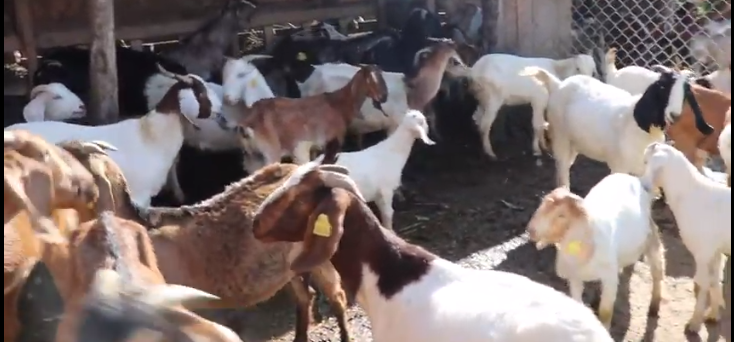Success of goat farming through cooperative: Mauja villagers in Kaski save Rs. 9 million a year

Krishna Dawadi, Kaski, Dec. 8: Farmers of Mauja village, Pokhara Metropolitan City-20, have been earning a decent income from goat rearing.
Farmers of Mauja village, which has been declared as a pocket area of goat rearing in the district, have been saving Rs. 9 million annually after deducting all expenses.
Commercial goat rearing was started in Mauja since 2005 and later in 2010, goat rearing group was formed. Similarly, in 2015 majority of the farmers started commercial goat rearing through Mauja Goat Breeding Agricultural Cooperative.
Durga Bahadur Gurung, Chairperson of Mauja Goat Breeding Agricultural Cooperative, said, “40 farmers of the village have been rearing goats under the cooperative, where 2,500 goats are being raised by the cooperative at present.”
Although 100 members are affiliated to the cooperative, others have been rearing buffalo, cow and cultivating vegetables as well.
As many as 10 goats are being raised in small farms while 200 goats are being kept in big farms of the village.
We, all farmers of the village, are satisfied with goat rearing as we collectively make Rs.90 lakh income by living in our own village, said Chairperson Gurung.
He added that there was no problem for the market as other wards and government offices were also giving the full support.
The big farmers of the village sell goats worth around Rs. 15 lakh annually and save Rs. 6 lakh a year from the business.
Similarly, Pokhara is the market hub for goat producers and sellers.
Furthermore, farmers have even providing the facility of delivering goats as per the demand from village in vehicles to the customers.
According to the cooperative, farmers from Parbat, Baglung, Syangja and other districts besides Kaski also come to buy crossbred goats of Khari and Boer breeds.
For breeding, goats are sold at the rate of Rs 1,000 per kg and other castrated goats at Rs 650 per kg, said Chairman Gurung.
Lately, even the youngsters of the village are getting attracted towards goat rearing business as decent income is optimized out of it in the village.
Furthermore, locals say that it has been easy to commute the produced materials to the market as the gravel road is being constructed in the area, which lacked a good road facility in the past.
However, farmers have complained that the government grants have not reached the real farmers although they have been making a good income from goat farming.
Farmers have demanded that the agricultural grant should be given on the basis of production as some farmers do the business for a year or two, till receiving the grant income.
Sim Bahadur Gurung, Ward Chair of Pokhara-20, said that the ward was known as the village of goat rearing and added that there was a plan to take goat rearing and other animal husbandry together.
He informed that the ward had provided assistance to the farmers through programmes such as distribution of seed goats and mowing machines.
“Our ward, Mauja is known as the pocket area of goats of the whole district,” he said.
Out of 33 wards of the metropolis, there is good potential for agriculture here, said Ward Chair Gurung.
He said that the plan is to make the place, an agricultural tourist hub by expanding productions from commercial agriculture and other business prospects. (Translated from RSS Nepali news)
Recent News

Do not make expressions casting dout on election: EC
14 Apr, 2022
CM Bhatta says may New Year 2079 BS inspire positive thinking
14 Apr, 2022
Three new cases, 44 recoveries in 24 hours
14 Apr, 2022
689 climbers of 84 teams so far acquire permits for climbing various peaks this spring season
14 Apr, 2022
How the rising cost of living crisis is impacting Nepal
14 Apr, 2022
US military confirms an interstellar meteor collided with Earth
14 Apr, 2022
Valneva Covid vaccine approved for use in UK
14 Apr, 2022
Chair Prachanda highlights need of unity among Maoist, Communist forces
14 Apr, 2022
Ranbir Kapoor and Alia Bhatt: Bollywood toasts star couple on wedding
14 Apr, 2022
President Bhandari confers decorations (Photo Feature)
14 Apr, 2022










